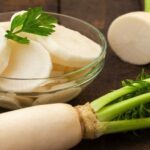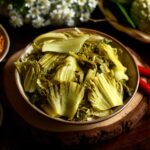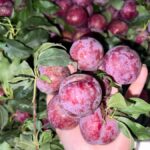The Downside of Pickled Cucumbers and Pickled Cabbage for Your Health
Pickled cucumbers and cabbage are simple, familiar dishes often found in family meals. These pickled treats, with their sour and salty flavors, are palate-cleansing and appetizing. They are rich in probiotics, fiber, and vitamin K, offering various health benefits such as improved digestion, enhanced immunity, and weight loss support.
However, consuming too much or preparing these dishes incorrectly can have negative consequences for your body.
- High Blood Pressure
Pickling vegetables requires a significant amount of salt for preservation. According to nutritionist Samantha Cochrane from Wexner Medical Center at Ohio State University (USA), pickled foods contain high levels of sodium. The American Heart Association states that a pickled cucumber contains 786 milligrams of sodium, which is nearly one-third of the recommended daily sodium intake of 2,300 milligrams for most adults.
Consuming large amounts of pickled cucumbers and cabbage introduces excessive sodium into your body. This disrupts the balance of sodium and potassium, impacting your kidney’s ability to filter water effectively. As a result, fluid retention occurs, putting pressure on your blood vessels and increasing the risk of high blood pressure.
- Bloating
The high sodium content in pickled foods can also increase the likelihood of experiencing bloating after consumption.
- Cardiovascular Harm
Foods with high salt content, such as pickled cucumbers and cabbage, elevate the risk of cardiovascular disease.

Four Health Conditions Where Pickled Cucumbers and Cabbage Should Be Avoided
- Stomach Disorders
Individuals with stomach or digestive issues are advised to refrain from consuming pickled cucumbers and cabbage. These foods contain high levels of acid, which can cause stomach discomfort, especially when consumed on an empty stomach, and may trigger pain by increasing stimulation.
- Kidney Problems
When kidney function declines, the body’s ability to eliminate toxins diminishes. In such cases, it is crucial to minimize salt intake. Consuming excessive salt during kidney problems can lead to water retention, weight gain, and interference with medication effectiveness, in addition to elevating blood pressure.
- Hypertension
Pickled cabbage and cucumbers are high in salt. When consumed, the salt increases water retention and causes vasoconstriction, leading to elevated blood pressure and potentially dangerous complications.
- Asthenia and Post-illness Recovery
According to traditional medicine, pickled cabbage has a cooling nature and is not suitable for individuals with a cold constitution. If consumed, it should be paired with warming foods like garlic, chili, and lemongrass.
Pickled cucumbers and cabbage are not recommended for those recovering from illness, as they do not provide the necessary nutrients for recuperation and contribute to increased salt intake, potentially causing further health issues.
Additionally, pregnant women should also avoid these pickled foods due to their high nitrite content. Nitrites can combine with amines found in seafood, meat, and fish to form nitrosamines, which are known to stimulate the formation of cancer cells.
Excessive consumption of pickled cucumbers and cabbage during pregnancy can also impact uterine activity, posing risks to the fetus. It is crucial for pregnant women to limit their intake of salty foods like pickled vegetables and avoid unripe or spicy varieties.
In summary, individuals with hypertension, kidney disease, stomach disorders, or those recovering from illness are advised to refrain from consuming pickled cucumbers and cabbage to maintain their health and well-being.
5 Vegetables You Should Avoid Eating at Night: A Guide to Protecting Your Stomach and Preserving Your Vitality, Especially for the Elderly
“Beware of these five seemingly healthy vegetables that may disrupt your digestive balance if consumed in the evening. With the arrival of late spring and the noticeable rise in natural yin energy, it’s essential to be mindful of these dietary choices to maintain optimal health and harmony within your body.”






































